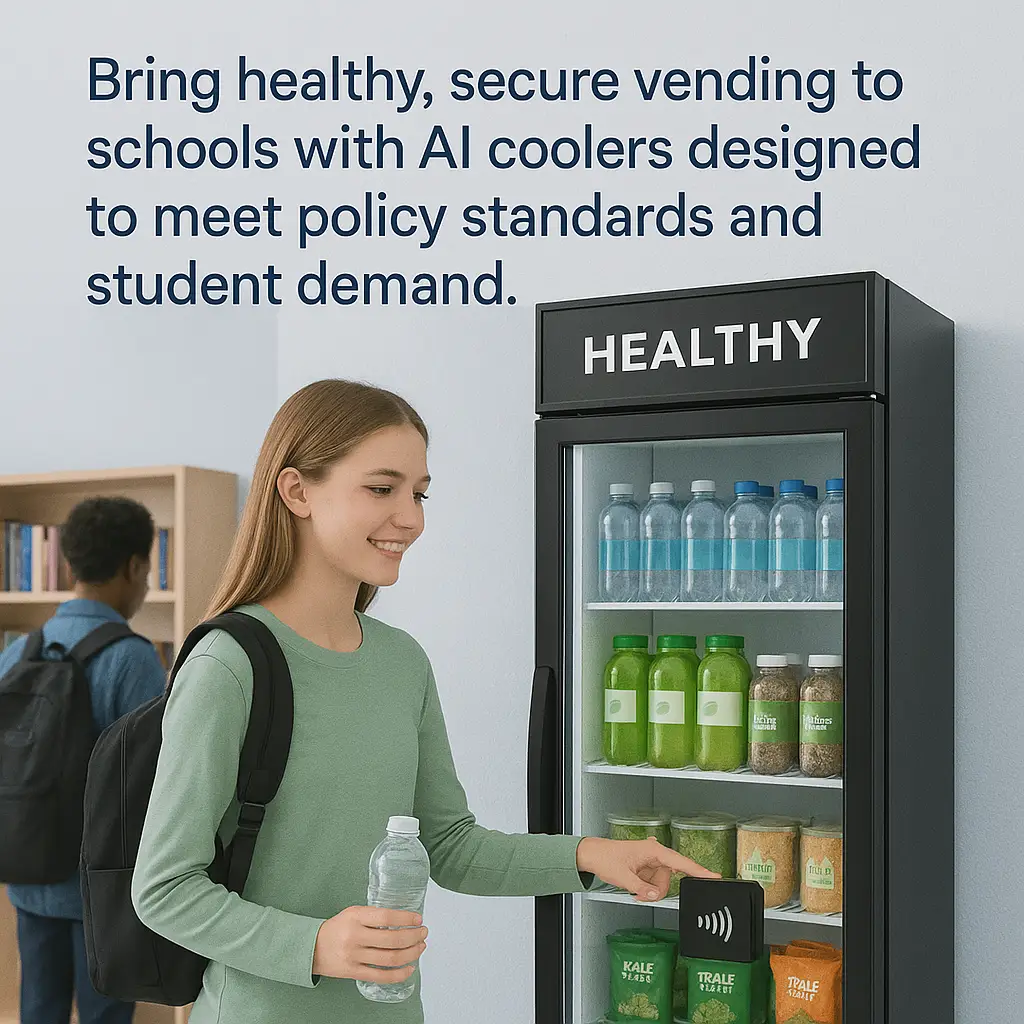AI Vending Coolers in Schools
Bring healthy, secure vending to schools with AI coolers designed to meet policy standards and student demand.
Back to AI Vending Coolers ResourcesBring healthy, secure vending to schools with AI coolers designed to meet policy standards and student demand.
Back to AI Vending Coolers ResourcesYes. AI vending coolers offer secure, policy-aligned dispensing while tracking nutritional compliance. Their locked, sensor-based access ensures students only receive approved food and beverage items.
![]() Smart coolers ensure only approved items are offered to students
Smart coolers ensure only approved items are offered to students
![]() AI tech monitors inventory in real time for restocking accuracy
AI tech monitors inventory in real time for restocking accuracy
![]() Touchless payment supports safer, faster student transactions
Touchless payment supports safer, faster student transactions

AI vending coolers are transforming how schools provide snacks and drinks to students—offering secure, compliant, and contactless self-service experiences. Unlike traditional machines, these coolers use built-in sensors and computer vision to monitor inventory in real time and track product selection. This allows only approved items to be dispensed while enhancing food safety and transparency.
One major benefit of deploying AI coolers in schools is nutritional compliance. Many districts are required to follow USDA Smart Snack Standards, limiting sugar, sodium, and calorie content in student-accessible items. AI vending systems can be preloaded with compliant menus, ensuring vending meets both policy requirements and health goals. School administrators can have full control over the types of products offered.
Another key advantage is security. With traditional vending, open access can lead to theft or misuse. AI coolers keep products locked behind glass doors until a registered, tracked purchase is completed—reducing shrinkage and discouraging tampering. And since the machines track each transaction digitally, reporting is more accurate and inventory loss easier to detect.
Students and staff will also appreciate the modern convenience of contactless payments. AI vending supports mobile wallets, credit/debit cards, and even student ID integrations where applicable, eliminating the need to carry or handle cash.
Finally, these advanced coolers help eliminate frustrations like empty shelves or broken machines. Real-time inventory tracking alerts vendors when items need restocking or when maintenance is required—improving service consistency compared to typical machines.
Looking for even more ways to meet school vending needs? Learn how healthy options are influencing better student outcomes or explore advanced technology solutions beyond coolers in automated vending systems for large facilities.
If you're exploring vending options for your business, Vending Exchange can help simplify the process. Delivery, Installation and Equipment is provided at no cost to you - vendors provide the machines, keep them stocked, and handle all servicing. Whether you need a provider or full-service management, just fill out the form on this page to get started.
Yes, as long as the items offered comply with local and federal nutrition standards for schools.
AI coolers keep items locked and only release products once payment is confirmed, minimizing theft or tampering.
AI coolers track inventory in real time and alert the vendor when restocking or maintenance is needed.
Absolutely. Schools can work with vendors to curate lists that meet nutritional standards and student demand.
AI vending typically accepts contactless payments like Apple Pay, Google Pay, credit cards, and in some cases, student ID integration.
No, they operate quietly, making them suitable for placement in academic or common areas.
Vendors can stock allergy-aware options and label ingredients clearly through digital displays or printed tags.
They often cost more upfront, but typically come at no cost to qualifying schools through vendor partnerships.
Yes, many AI vending platforms provide detailed dashboards showing product performance and machine health.
Most installs are completed in under a week, depending on location readiness and machine availability.